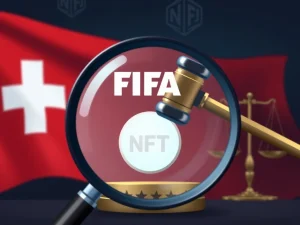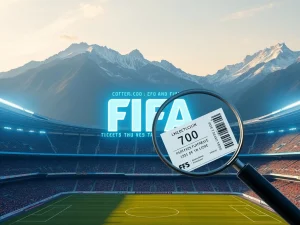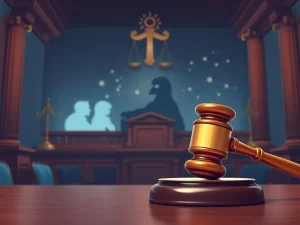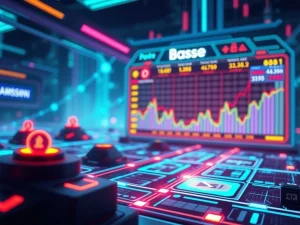Crucial NFT Trademark Ruling: Ninth Circuit Overturns Yuga Labs Judgment, Reshaping Digital Asset Law
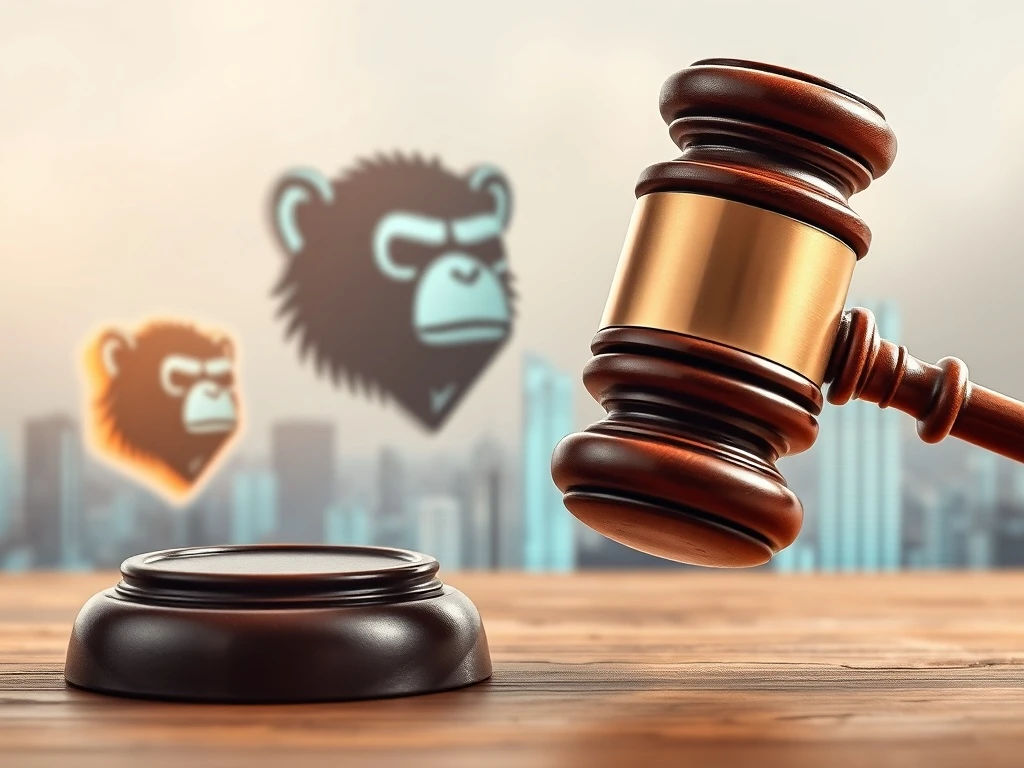
In a development that has sent ripples through the digital asset world, the U.S. Ninth Circuit Court of Appeals has delivered a landmark decision, overturning a significant $9 million judgment previously awarded to Yuga Labs. This ruling, central to the ongoing Yuga Labs Lawsuit against artist Ryder Ripps, isn’t just about the money; it’s a crucial moment for defining the boundaries of NFT Trademark law and intellectual property in the Web3 era. For anyone invested in or curious about the future of digital collectibles, this case sets a compelling precedent.
The Heart of the Matter: Why Consumer Confusion Was Key
At the core of the Ninth Circuit’s decision lies the principle of consumer confusion, a cornerstone of trademark infringement claims. Yuga Labs, the creators of the iconic Bored Ape Yacht Club (BAYC) NFT collection, had initially secured an $8.8 million award against Ryder Ripps. Ripps had launched his RR/BAYC collection, which he openly described as a satirical commentary on BAYC’s cultural impact.
The district court had sided with Yuga Labs, concluding that the visual similarities and naming conventions of the RR/BAYC NFTs were likely to mislead buyers into believing they were official Yuga Labs products or endorsed by them. However, the appeals court challenged this, stating that the lower court erred by relying on a summary judgment, which essentially bypassed a full trial where factual disputes could be thoroughly examined.
The Ninth Circuit emphasized that for a trademark infringement claim to stand, there must be concrete evidence that consumers were genuinely confused. This means demonstrating that Ripps’s project actually misled people into thinking they were buying a Yuga Labs product, rather than merely observing a parody or critique. The ruling demands a retrial, where Yuga Labs must now present more robust evidence to substantiate their claims of brand harm and actual Consumer Confusion.
Key Takeaways from the Ninth Circuit’s Decision:
- No Automatic Confusion: The court highlighted that visual similarity alone isn’t enough; actual consumer confusion must be proven.
- Importance of Trial: Summary judgments are not always appropriate, especially when artistic expression and parody are involved.
- NFTs as ‘Goods’: Crucially, the court affirmed that NFTs are indeed ‘goods’ under U.S. trademark law, a significant step in legitimizing them within traditional legal frameworks.
Navigating the Legal Landscape for Digital Assets
The classification of NFTs as ‘goods’ under U.S. trademark law is a groundbreaking development. For years, the legal status of NFTs has been ambiguous, with debates over whether they are merely digital tokens, unique digital files, or something else entirely. This ruling provides a clearer legal foundation for trademark protection, potentially encouraging more brands to enter the NFT space with greater confidence.
However, this clarity comes with its own set of challenges. The appeals court’s skepticism regarding Yuga Labs’ evidence raises the bar for proving harm in similar cases. Plaintiffs will now need to demonstrate tangible Consumer Confusion rather than relying on abstract notions of brand dilution. This could deter speculative lawsuits, fostering an environment where innovation and artistic expression have more room to breathe without immediate fear of aggressive trademark enforcement.
The case also shines a spotlight on the inherent tension between intellectual property rights and artistic freedom. In the NFT space, where parody, satire, and transformative works are common, the lines between infringement and creative expression can easily blur. Legal experts note that this ruling reflects broader debates about regulating decentralized, global digital markets where brand enforcement is complicated by blockchain’s immutable and distributed nature. The application of traditional trademark frameworks to Digital Assets is proving to be a complex, evolving field.
Impact on the Blockchain Ecosystem: Who Wins?
This ruling has multifaceted implications for various stakeholders within the blockchain ecosystem:
For Large Brands and IP Holders:
- Clearer Protection: The affirmation of NFTs as ‘goods’ provides a more solid legal basis for protecting their NFT Trademark in the digital realm.
- Higher Bar for Proof: They must now gather more concrete evidence of actual consumer confusion, rather than relying on presumed brand dilution, making lawsuits more resource-intensive.
- Strategic Rethink: May lead to more nuanced strategies for brand protection, focusing on education and community engagement alongside legal measures.
For Independent Artists and Small Creators:
- Empowerment: The higher burden of proof for plaintiffs could empower smaller creators to engage in parody or transformative works without immediate legal threats.
- Lingering Gray Area: Despite the ruling, the lack of clear guidelines on parody in NFT contexts still leaves many in a legal gray area, requiring careful navigation.
- Resource Disparity: Large entities still possess greater resources to pursue litigation, potentially stifling innovation even with a higher bar for proof.
For Investors and the NFT Market:
- Increased Clarity: Legal clarity on NFT Trademark protection could instill greater confidence, encouraging more mainstream adoption and investment.
- Valuation Dynamics: The outcome of the retrial could significantly influence the perceived value and stability of high-profile NFT collections.
- Regulatory Precedent: This case sets a crucial precedent for future litigation and regulatory approaches concerning digital assets.
What’s Next for Blockchain Law and Digital Rights?
As the retrial looms, the Yuga Labs vs. Ryder Ripps case remains a pivotal moment in defining how brand rights operate in the digital realm. Its resolution will undoubtedly influence future litigation strategies, regulatory approaches, and the valuation dynamics of NFTs. If Yuga Labs fails to prove its case in the retrial, it could undermine the perceived value of high-profile NFT collections, affecting investor confidence and perhaps even encouraging more satirical projects.
Conversely, a successful defense of trademark rights by Yuga Labs, backed by concrete evidence of Consumer Confusion, could set a stricter precedent for brand protections in the Web3 space. This would reshape the landscape for digital art and crypto assets, potentially leading to more cautious approaches by creators and a greater emphasis on licensing and official partnerships.
The implications extend beyond just NFTs. This case is a test of how traditional legal frameworks adapt to the decentralized, global nature of Blockchain Law. It highlights the challenges of enforcing intellectual property in a world where digital assets can be easily replicated, remixed, and distributed across borders. The outcome will provide valuable insights into the future of digital ownership, creativity, and legal recourse in the evolving Web3 paradigm.
This decision is not just a win or loss for one party; it’s a critical step in the ongoing evolution of how we understand and protect rights in a world increasingly shaped by digital innovation. It underscores the need for creators, brands, and consumers alike to stay informed and adapt to the rapidly changing legal landscape of the metaverse.
Frequently Asked Questions (FAQs)
Q1: What was the main reason the Ninth Circuit Court overturned the Yuga Labs judgment?
A1: The primary reason was Yuga Labs’ failure to conclusively demonstrate consumer confusion. The appeals court ruled that the lower court erred by relying on summary judgment without sufficient concrete evidence that Ryder Ripps’s RR/BAYC project actually misled consumers into believing it was an official Yuga Labs product.
Q2: How does this ruling affect the legal status of NFTs?
A2: Crucially, the ruling affirmed the classification of NFTs as “goods” under U.S. trademark law. This provides a clearer legal foundation for trademark protection for NFTs, legitimizing them within traditional legal frameworks and potentially encouraging more brands to enter the space.
Q3: What does “consumer confusion” mean in the context of this NFT trademark case?
A3: Consumer confusion refers to whether consumers are likely to be mistaken about the source, sponsorship, or affiliation of goods or services due to a similar trademark. In this case, it means whether buyers of RR/BAYC NFTs genuinely believed they were purchasing NFTs from Yuga Labs or that Yuga Labs endorsed the RR/BAYC collection.
Q4: What are the implications for artists and creators who make parody or satirical NFTs?
A4: The ruling suggests a higher bar for proving trademark infringement, potentially empowering smaller creators and artists to engage in parody or transformative works without immediate legal threats. However, it also highlights the continued legal gray area, as the balance between artistic freedom and trademark protection remains complex.
Q5: What happens next in the Yuga Labs vs. Ryder Ripps lawsuit?
A5: The case will be sent back to the lower court for a retrial. Yuga Labs must now present more concrete evidence to substantiate its allegations of brand harm and actual consumer confusion to prevail in its trademark infringement claim.
Q6: How might this ruling impact investor confidence in the NFT market?
A6: While providing clearer legal status for NFTs as “goods” can instill confidence, the increased burden of proof for trademark holders might deter speculative lawsuits, leading to a more stable but potentially slower-paced market. The ultimate impact will depend on the outcome of the retrial and how future legal precedents are set.


